Enab Baladi – Special Report
Without any professional controls or strict laws limiting the spread of hate speech in cyberspace, dozens of websites and accounts carry out their activities through social media and follow or promote intellectual, political or military groups in Syria, without taking into consideration social groups and communities that are rooted in the Syrian landscape. They promote a discourse that is loaded with political, national and religious divisions, increasing social tensions created by six years of revolution, war and complex international interference.
It is normal today, for anyone who follows Syrian affairs through social media, to find dozens of words and terms that carry a great deal of hatred, in a discourse fueled by war and biased towards certain factions, parties and religious or ethnic groups. For instance, we see news that contains the terms “the polytheist Nusayris”, “the atheist Kurds”, “the Daeshi (ISIS-leaning) Arabs”, “apostates”, “terrorists”, “the Awakenings” and other terms.
Syrian journalists we met with unanimously agreed on the need to, first, acknowledge the existence of “hatred”, which has strengthened conflicts between social groups, then to seek to address excessive media “demagoguery” by working to improve media discourse and assume professional and moral responsibility towards Syrian society with all of its components, without violating freedom of expression, which the Syrian regime has restricted for decades.
How has hatred been promoted among communities?
The outbreak of the revolution against Bashar al-Assad’s regime in March 2011 was a turning point for the media scene, transforming it from a comprehensive media under the control of the ruling “Ba’ath” party to a broad space that witnessed the emergence of newspapers, radio stations, news agencies, websites and TV channels that came to be known as “the new Syrian media” and played a prominent role in reporting local events to the rest of the world.
With the regime’s violent crackdown, the media scene witnessed the emergence of media platforms through social media websites with different political, military and ethnic tendencies that transformed Syria’s differences into a battlefield. New terms have been developed and used to name entire social groups, creating a chasm between communities and fueling hate speech.
According to journalists interviewed by Enab Baladi, the Syrian regime bears primary responsibility for the current situation, since it decided to criminalize all protestors who were against it through official or close media platforms, describing them as “saboteurs, terrorists, agents, mercenaries and Salafists”. This was the first form of political media alignment. Therefore, Syrians were categorized either as patriots when they supported the regime or “terrorists” when they were against it.
This division has evolved to include most social groups, in light of the military and political complexities in Syria and the emergence of fundamentalist groups that adopted ideological approaches that were reflected in their media discourse. For example, ISIS, which has a relatively advanced media wing that is active on most social media websites, has used adjectives against its opponents that promote hatred, such as “the atheist Kurds”, “the polytheist Nusayris”, “the apostate Awakeners”, “the infidel West”, “the Crusaders”, and others.
In addition, the platforms of some political parties or military factions have also played a role in promoting this negative discourse, which is directed through the internet against particular social groups, which may threaten civil peace on the ground. For example, some websites and pages close to a Kurdish political party, adopted a hostile discourse against Arabs on Facebook, describing them as “al-Dawaesh” (ISIS members) while some Arab websites and pages described the Kurds as “separatists”.
The Syrian press: “Unite to denounce hatred”
At the invitation of Enab Baladi, a Syrian media forum was held in the Turkish capital, Istanbul, on May 8, 2017 to discuss the current situation of local media and its role in addressing hate speech. The forum was titled “The Syrian Press: Unite to Denounce Hatred” and was attended by 14 visual and audio-visual Syrian media institutions.
The participants came out with a series of recommendations addressed to the Syrian media and journalists aimed at reducing media messages containing ideas, information or vocabulary that might cause or increase tensions between communities in order to achieve a professional and national media discourse that promotes civil peace in Syria.
The forum participants agreed on a definition that described hate speech as “any discourse that includes exclusion, marginalization, insult, incitement, negative discrimination, abusive stereotypes or defamation that is, directly or covertly, directed against a social group, in accordance with a systematic or arbitrary policy”.
What are the outcomes of the forum?
At the level of terminology, the forum stressed the need “to avoid using generalizing words and terms that may offend any social group in Syria, and any terms that clearly distinguish between the assessment of political, partisan or military authorities and the description of an entire social group, and the need to use unifying terminology that enshrines the concept of citizenship and contributes to the maintenance of social peace”.
At the level of media content, the participants stressed the need for Syrian media to apply professional standards in the press, convey and explain information to the public in an objective and balanced manner, accurately select sources concerning controversial issues, not to confuse between opinion and news, distinguish between political and journalistic work, and close media platforms to voices that promote hatred.
The forum also recommended “diversifying media content to ensure a fair coverage of all Syrian communities, reducing tensions between Arabs and Kurds in media messages, and applying this to all other communities”.
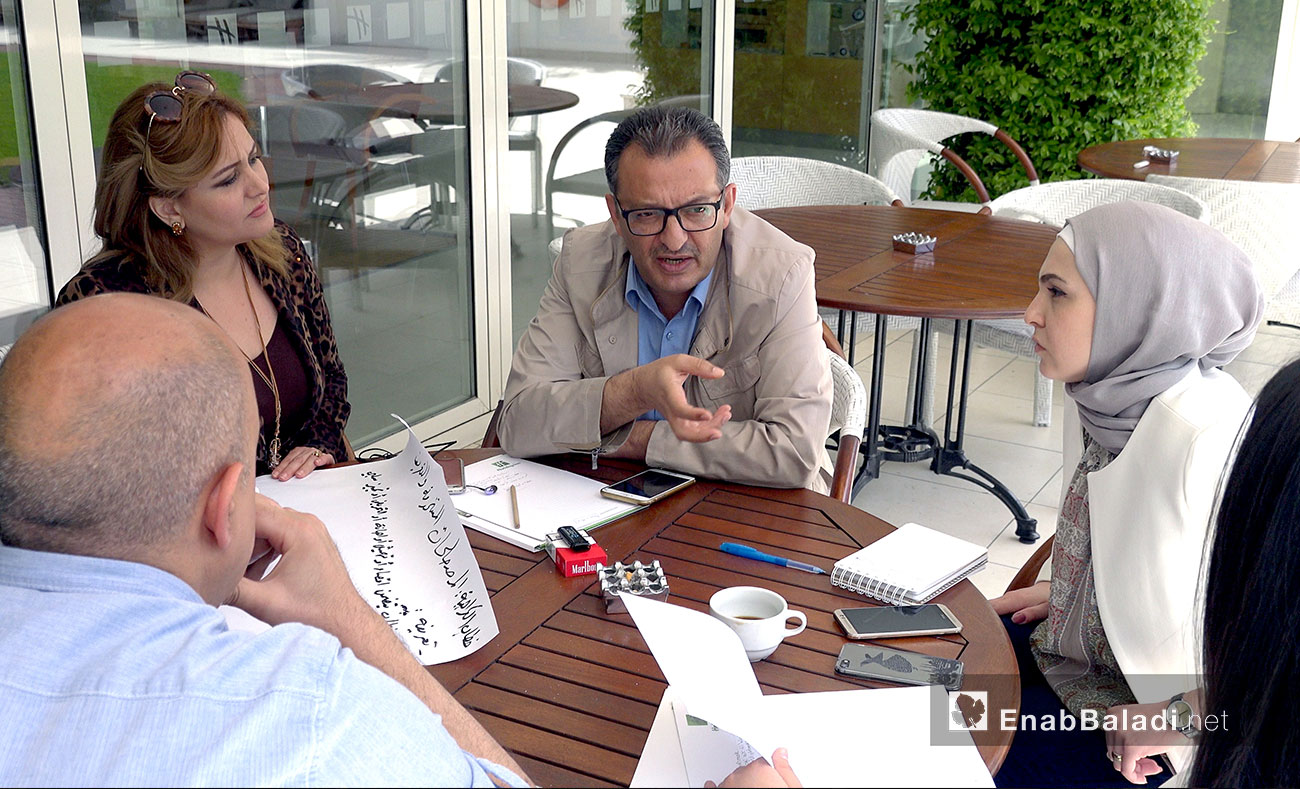
Working groups at the “Syrian press together to renounce hate speech” Forum, May 8, 2017 (Enab Baladi)
The participating media groups agreed to adopt media messages that promote the need to “refrain from disseminating all calls for violence, discrimination and incitement, and that disseminate information and content that promote the culture of accepting and recognizing the other and contribute to enshrining the values of coexistence, and to launch media campaigns against extremism, exclusion and extermination”.
The participants asserted the need for Syrian media institutions to sign up to local or international media codes of ethics in order to denounce hatred, adopt policies that “promote regional and ethnic diversity within the staff of Syrian media institutions”, and the need to implement codes of conduct for journalists, which ensures avoidance of hate speech in their press coverage and in their posts on social media networks.
The forum stressed the importance of increasing the number of training programs dealing with ethical and legal issues in the media, and the importance of establishing partnerships between local media institutions from different backgrounds in order to enhance media cooperation between national institutions and reach all sections of the Syrian public. It also recommended the publication of a joint guide on “positive and negative” media terminology, which might either increase or decrease hatred in media discourse.
Arab and Kurdish media institutions:
We denounce hatred and call for civil peace
After the Syrian Press Unite to Denounce Hatred Forum, Enab Baladi spoke to administrators and journalists representing eight Syrian media outlets about their experiences in addressing hate speech and the challenges they face in this context.
Lujain Haj Yousuf, chief news editor of Rozana Radio, says that hate speech that is widespread across social media websites has an impact on media institutions, since the public is prepared for such a discourse.
“In Rozana Radio, we tried to be neutral with the parties, to be objective in raising the issues, to focus on promoting coexistence between Syrians, and to try to address cultural topics, such as Kurdish culture and introducing this topic to Syrians.” She added, “Topics reported on by Rozana fall under the editorial policy of the institution, with a focus on building civil peace and the need to maintain social peace, refraining from publishing material that creates sensitivities and that are not based on correct documentation”.
The Director-General of Halab al-Yawm (Aleppo Today) TV (who asked that his name not be disclosed) said that the general policy of the network since its establishment is based on respect for the Kurdish community and its place as an essential component of Syrian society, as well as respect for its linguistic specificities, norms and traditions. The director said, “We consider that the Kurdish news broadcast on the channel is a form of respect towards the Kurdish language, and that media coverage of public affairs in these areas, including cultural and folkloric themes, is critical for us.”
The head of Halab al-Yawm TV pointed to the sensitivities over using some terms, “We insist on this aspect. We worked on distinguishing and identifying discourse and avoiding all types of generalizations. For instance, we say ‘a faction has attacked’ and not ‘the Kurds have attacked’.” He added, “There is a politicized discourse in the Kurdish areas, as well as very complex political interests. Consequently, the channel tries to maintain its own approach on this issue, namely, that the Kurdish population is a fundamental part of Syria and that good coverage must be allocated to it”.
Omar al-Khateeb, a journalist at Orient stressed the need to define the term “hatred” and emphasized the importance of “not allowing fake generalizations and holding a whole group responsible for the actions of a political party or political figure”. Al-Khateeb added, “In Orient, we address all Syrians and we represent all Syrians – Kurds, Arabs and other ethnic groups and sects. However, that does not mean that we have to have mutual fear or shy away from criticizing certain political actors.”
Omar al-Khateeb asserted also that “the current phase in Syria is clear, in terms of the various political projects and coalitions. Those who are allied with the al-Assad regime, Russia and Iran must be considered as enemies of the Syrian people. When we attack or criticize a certain ally to these political forces, this does not mean that we criticize or despise the local community. We as journalists view Syria as a unified whole, and it is natural that we reject some stances and oppose them without fear or threat of being censored. We are journalists and not politicians. Our job is to convey and clarify the different views and stances”.
Talking about the agency’s approach to the Kurdish issue, Mohamed Alaa, the editor-in-chief of Smart News Agency, said, “We have several offices in al-Hasakah governorate, the towns of Ayn al-Arab and Tell Abyad as well as Afrin. These offices are located in the areas under Autonomous Administration. We follow developments that relate to our editorial policy on an ongoing basis and report on the different social and economic issues in a balanced manner.”
Smart News Agency focuses on the social, economic and military specificities of the province of al-Hasakah, with special covering of events and holidays. Alaa added, “Smart News’ offices are authorized by the Autonomous Administration in the region. We are facing some restrictions but there is some form of cooperation in return.”
Media authorities to monitor discourse
As for the role of the Syrian Journalists Association (SJA) in confronting all forms of hate speech, Razan Ameen, a journalist and the head of the association’s New Media Committee, explained that “the Association has worked to bring together all Syrian journalists from all intellectual backgrounds, ideologies and religions around the basic principles we adopted in the Charter. When a particular institution or journalist commits a violation, a warning is directed to the establishment or individual, then the SJA issues a statement on the subject. Based on that, we take the relevant procedures.”
Razan Ameen added, “Through the last forum, we achieved a positive interaction and convergence of views. We reached a clear definition of hate speech and the terminology that strengthens this discourse. We might create a guide clarifying these terms. This would be a big step if it is achieved.”
Hussein Berro, a member of the Ethical Charter for Syrian Media, said, “The Charter tries to reduce hate speech and legally regulate it by presenting it as a major issue. However, we have not yet achieved this on the ground. But after the charter was issued, we observed a significant development in terms of self-discipline among the institutions that signed it.”
Berro clarified, “Forty-five media institutions have signed the Charter so far. There will be an advisory committee composed of journalists, legal experts and civil society organizations, which will begin to receive complaints from the public and monitor the activities of the signatory institutions. The committee will issue media reports every three months to the public, which will identify which establishments are respecting the charter and which are not doing so, so that the public can participate together with the institution.”
Hussein Berro considers that “the forum put forward the idea, and enabled an exchange of views about the issue, which is a good thing. There used to be many issues that we ignored as a result of a long-held policy of compromising at the expense of our fundamental principles. Violent discourse and hate speech exist, and today we acknowledged the problems and mistakes caused by some media institutions, which is a first step in the right direction. Its continuation depends on the extent of our colleagues’ enthusiasm and willingness to discuss the issue.”
The Kurdish contribution to “denouncing hate speech”
Farouq Hajji Mustafa, head of the Berchav Organization for Media and Freedoms, explained to Enab Baladi that, since its inception in 2013, the organization has focused on how to create and strengthen social harmony between Arabs and Kurds, especially as the Kobani region (where the organization is located) is adjacent to Arab regions. Today’s forum was important in crystallizing important concepts concerning the rejection of hate speech and defining it as well as the needs for the next phase.
Mustafa also said, “Civil peace begins through workshops, networking and meetings. The next social and political phase in Syria will involve capacity-building and establishing communication channels between communities and political groups, with all their different ideologies and approaches.”
Referring to the role of his media institution in the process of reinforcing civil peace and renouncing hate speech in Syria generally, Serwan Haji Barku, the General Manager of ARTA FM, said, “We address the Syrian situation in its totality but we are specifically concerned with developments in al-Jazira and Kobani. For this reason, we established a number of partnerships with several Syrian media institutions (Enab Baladi and Radio Hara FM), which will enable us to revive a dialogue between Syrian regions as a whole.”
“It is important for us that the channel’s audience know what is happening in other regions and listen to the voices of Syrians living elsewhere expressing their opinions on a variety of issues, such as Arab-Kurdish dialogue and social issues. ARTA FM’s presence from the outset and the fact that it broadcasts in four local languages have contributed to building a bridge between all ethnic and religious groups. There is no ‘Arab’ and ‘Kurd’, but rather compatriots of each area”.
Mr. Barku concluded, “ARTA FM is not a Kurdish radio station. It is a radio station for all residents located in the broadcasting region (al-Hasakah, al-Jazira and Kobani). We do not use ethnic or religious discourse and we use all terminology in a professional manner.”
International efforts to denounce hate speech
The last century has witnessed two world wars and a huge number of revolutions in all countries around the world. This demonstrates the deep conflict between calls for freedom and civil rights on the one hand, and violence linked to hatred and violating other’s rights on the other.
These security and political changes and their social repercussions have influenced the renaissance in media, in one way or another, and been reflected in media content and messages. Certainly, the media has often been exploited as a means of promoting conflict and employed by political or party figures, those with extreme racist tendencies or marginalized groups that misused the media to express themselves.
With the increasing pace of this conflict, as a result of the spread of mass media in the second half of the twentieth century, there has been an increasing tendency to create international laws and charters that limit the propensity of the media to disseminate speech that incites violence against others and fuels strife or contributes to the exclusion and marginalization of other social groups. Thus, the media began to regulate the scope of its freedom and assume its responsibilities.
United Nations resolutions
In 1948, the United Nations adopted the Universal Declaration of Human Rights. Article 19 of the declaration states that “Everyone has the right to freedom of opinion and expression; this right includes freedom to hold opinions without interference and to seek, receive and impart information and ideas through any media and regardless of frontiers.”
The International Convention on the Elimination of All Forms of Racial Discrimination (1965), sponsored by the United Nations, is the first international treaty that deals directly with the subject of hate speech. It states that “any dissemination of ideas based on racial superiority, hatred or incitement to racial discrimination and any act of violence or incitement to such acts shall be committed against any race or color group or other ethnic origin (…) is a crime punishable by law”.
The International Covenant on Civil and Political Rights, adopted by the General Assembly of the United Nations in 1966, calls for the elimination of hate speech from media content. Article 19 states, “the rights and the reputation of others shall be respected”. Article 20 also provides for “prohibition of any propaganda of war under the law and prohibition of any advocacy of national, racial or religious hatred that constitutes incitement to discrimination, hostility or violence.”
In addition to this resolution, several countries and federations around the world have adopted special covenants on freedom of expression but in general they do not appear to be detailed when it comes to hate speech, according to a report by the Office of the High Commissioner for Human Rights titled “Incitement to racial and religious hatred and the promotion of tolerance” (2006).
International and local “deterrence” laws
The UN Human Rights Council has set three levels of legal penalties for hate speech according to the type of expression. The first requires criminal prosecution, the second requires civil prosecution and the latter does not require legal prosecution but places the speech in question as “disturbing”.
Such loose international standards, however, mean that there is a need for local laws to regulate hate speech, which is usually exploited in accordance with state and regime policy.
While the American Convention on Human Rights states that “advocacy of hatred on national, racial or religious basis is a criminal offense” and requires national laws to implement this, the European Convention on Human Rights and the African Charter on Human and Peoples’ Rights” do not require that the law prohibit hate speech.
Legal penalties are also linked to the type of media discourse (defamation, incitement and racial discrimination), further complicating laws against hate speech and increasing gaps that reduce their effectiveness.
Facing online hate
The internet may have provided ample space for expression, away from the controls of publishing policies or legal prosecution, but at the same time it has created an awareness among professional media organizations, users and governments of the dangers of this discourse, and of the need to act to determine its nature, channels and promoters.
Last March, the European Union, in collaboration with four of the world’s leading internet companies, launched a “code of conduct” aimed at combating hate speech across the internet, social networking sites and new digital media networks. The initiative included Facebook, Twitter, YouTube, and Microsoft.
At the local level, there have been serious moves in some countries to enact laws in this regard. The German Ministerial Council has recently approved a bill requiring companies operating social networks on the internet to delete or block content that is proscribed by law such as defamation or incitement.
Jordan is one of the leading countries in the Arab world in combating hate speech, enacting a law that imposes large fines and penalties of up to three years in prison for those who are proven to have carried out hate speech.
Media as a path to peace… Please carry on!
Zaidoun Al–Zoabi
In March 2011, the Syrians opened their eyes to a society rife with social strife that threatened its existence. For decades, we had thought that our society was unified and cohesive, remaining ignorant of, and blinded to, such issues, which were practiced by the authorities.
Dualities surfaced whose existence many of us were unaware of – big cities and small cities, countryside and urban areas, Western Syria and a marginalized North-East, Arab and Kurdish, Islam and Christianity, Sunni and Alawite, conservative and secular.
On top of all this, new dualities have emerged, which grew with the deepening of the crisis, such as opposition and loyalism, foreign and internal, armed and civil, and perhaps others. This caused Syrian society to become completely fragmented in all senses of the word. Each party in each duality seeks to ensure its presence through exclusion, marginalization, or even annihilation of the other until the nature, and even the existence of Syrian society as a whole were threatened.
It can be said that the media was a key factor behind hate speech between these opposing forces, as well as one of its symptoms. It has entered into a cycle of evil that it fosters and by which it is nurtured.
Platforms to demonize entire social groups were established, openly and even proudly in some cases, while other platforms a discourse that appeared far from sectarianism and racism, but which subtly promoted a poisonous racist discourse, perhaps more dangerous than its predecessor.
I have the honor of having had a unique first-hand experience of making the media a tool for advocating peace and a platform for countering hate speech, through the Ethical Charter for Syrian Media, as the facilitator at most of the meetings on the Charter.
Perhaps the organizers of the last forum did not intend the Charter to be the subject of dialogue for Syrians or a method for combatting the discourse of hatred, discrimination and racism, but it has proven to be both. It has been perhaps one of the best efforts to provide a real platform for media dialogue for important actors on the media scene in order to establish a moral and professional framework for media work.
This framework will open the way for the media to return to its basic message of building society, after having been for decades a tool to destroy society.
Under this Charter, and with the will of a number of institutions that adopt other charters no less important than the Ethical Charter, 14 media institutions have come together to implement the Charter in their core task of repairing the divisions in Syrian society and addressing one of the important divisions that carries within it many others, the Arab-Kurdish duality.
This workshop, which I had the privilege of facilitating, was not like many other workshops on which much money is spent without having any impact. It was an important opportunity offered by Enab Baladi and ARTA FM and supported by other important institutions to enter directly into an effective and influential debate.
We asked ourselves many questions such as how to move from hate speech to speech that seeks truth and builds society, how to deal with the current real problem of hate speech between Arabs and Kurds and the deliberate or unintentional role of the media in reinforcing it, and whether we are really addressing the problem or simply making do with Article 5 of the Charter to relieve our consciences through mere concepts?
The meeting was not able, and was not supposed, to answer all these questions but it opened the door to practical solutions and difficult questions, through keen participation and serious efforts to find solutions. None of the participants wanted this meeting to end, like many other meetings. The dialogue was serious and the difficult questions posed pushed us to look for unconventional answers.
This was a first and bold step but it will remain insufficient if we cannot take further, perhaps even more daring, steps. If the organizers of the workshop cannot deepen the discourse and take it to a practical level, and address topics that may be more sensitive, such as the issue of opposition and loyalty to the regime and the conservative and secular divide, it would have been better not to even take the first step. Please carry on!
This file was prepared by Enab Baladi in collaboration with ARTA FM Radio
if you think the article contain wrong information or you have additional details Send Correction
النسخة العربية من المقال
-
Follow us :
Most viewed
- Israel threatens Damascus via Jaramana
- Negotiations between SDF and Damascus: Agreement on generalities, disagreement on details
- Suspension of EU sanctions: Limited impact fails to meet recovery needs in Syria
- Challenges paralyzing electricity sector in Syria
- Why Damascus remains silent about Netanyahu's threats?











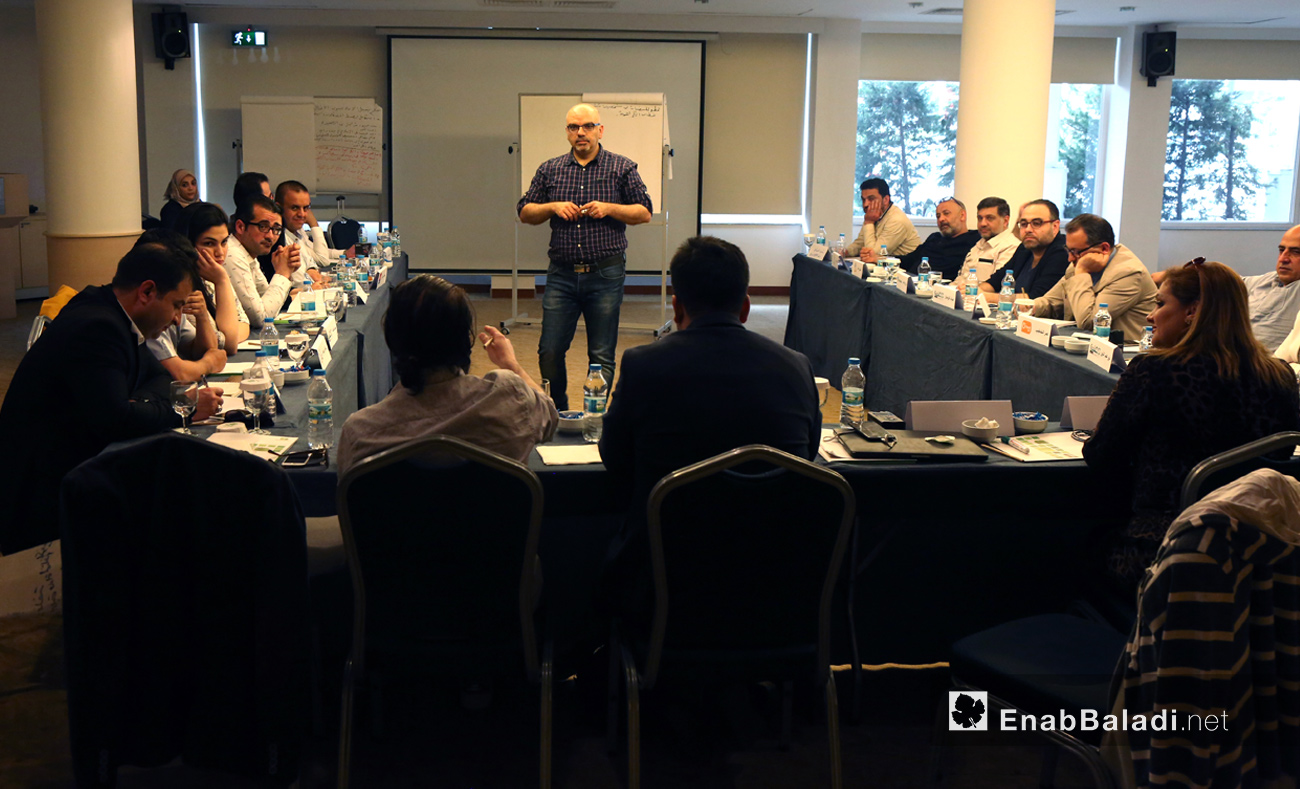
 "Syrian press together to renounce hate speech" Forum, May 8, 2017
(Enab Baladi)
"Syrian press together to renounce hate speech" Forum, May 8, 2017
(Enab Baladi)





 A
A
A
A
A
A

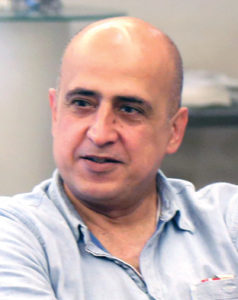
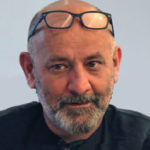
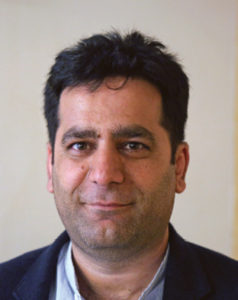
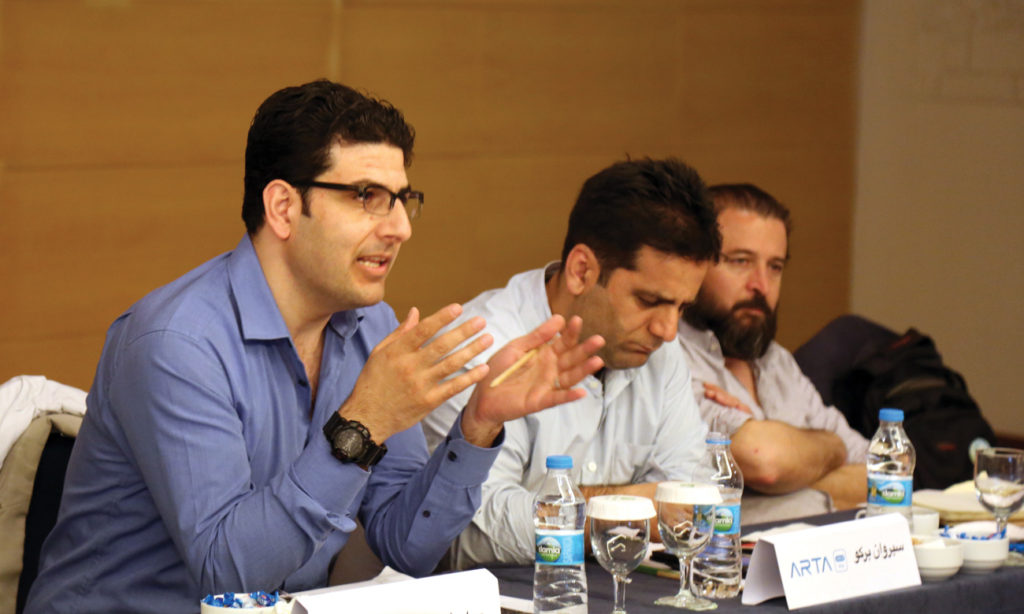



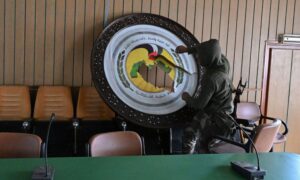
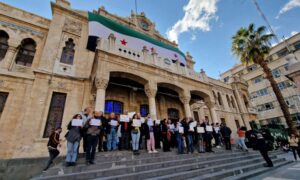
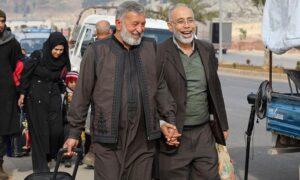

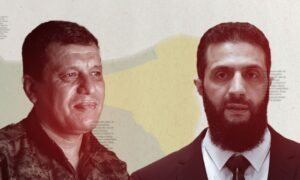
 More In-Depth
More In-Depth